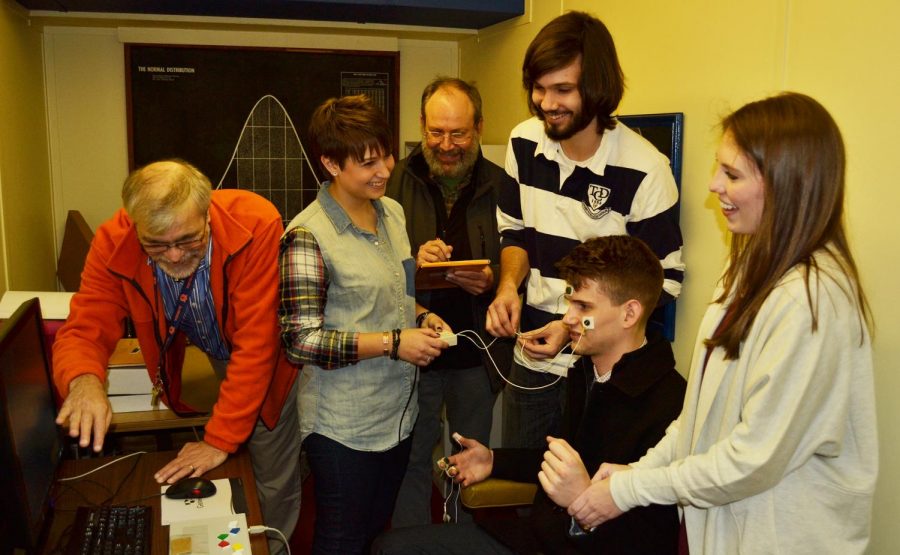UNA psychology professors prepare for new research projects
January 23, 2014
Imagine sitting in a closed white room with a few common household objects scattered across a table in front of you. Suddenly, out of the corner of your eye, you make out a forbidden object — a Ouiji board.
‘Forbidden’ objects, like this Ouiji board, are just one of many subjects the psychology department will be studying in 2014.
Professors of Psychology Larry Bates and Richard Hudiburg are working on seven projects this year, with selected students to head each project. Three of the projects focus on religion and how it can cloud our judgment as human beings.
“Research has always been an area I was interested in, but working with Dr. Bates and Dr. Hudiburg has provided me with an opportunity to learn how to design and conduct a research study on a very interesting topic,” said Sarah Schiavone, who is involved with the program. “I greatly enjoyed the process and work involved, but it has also given me valuable experience that will better prepare me for graduate school.”
The first project, Religion, Aesthetics and Value, headed by Schiavone, a senior, focuses on how certain objects can affect someone depending on his or her religion.
“We’re trying to look at fundamentalism and fear,” said Bates. “If we know it is fear, it can help us understand this kind of more benign form of fundamentalism. We can understand more extreme problems like terrorist attacks and things of that nature. But if it’s not fear then scientists need to stop using the word, because we’re just bumping it around and impeding the implication without helping it.”
The second project, directed by senior Kayla Bales, is called Religion, Quality and Value.
“We’re actually getting people to rate the quality of the product based on the label,” Bates said.
This project is similar to the first one, but focuses on the actual value of a product based on religion rather than how pleasing each item is.
The third project by Bates and Hudiburg also ties in religion, but with a twist. It will focus on how religion can affect someone’s cognitive skills.
“We’ll have a maze where one will help Joe find his keys and the other maze will help Joe find his pot,” Hudiburg said. We want to know if people who are religious have inner fears that should interfere with their performance.”
The professors believe people who are religiously fundamental will have a longer time getting through the maze versus other who are not so religiously inclined, Hudiburg said.
“Inhibiting a response to a resource will tend to slow it down,” said Hudiburg. “People who are religiously fundamental will take longer to respond and make more errors in their response like in a maze.”
In addition to these three projects, Professor of Psychology Ryan Zayac is also contributing to the department by conducting a special project this year at Kilby Laboratory School.
Zayac has been greatly interested in teaching and promoting learning since he started his career, he said.
“I developed an interest in the scholarship of teaching and learning,” said Zayac. “As part of this interest, I have been working on several projects related to evidence-based, behavioral teaching methods that are designed to improve student academic performance using well-established learning principles.”
“Inter-teaching has been shown to be extremely effective in improving college students’ exam scores,” Zayac said. “However, there have been no published studies examining its effectiveness on younger students’ performance.”
Zayac wishes to model the inter-teaching method and apply it to his research conducted at Kilby, he said.
“The inter-teaching project that is being conducted at Kilby with fifth and sixth grade students is a chance to work collaboratively with a valuable campus resource and to extend the research literature on this teaching method to a new population,” said Zayac. “My hope is that students in Matt Fulmer and Michele Derouen’s classrooms will benefit from this instructional approach.
(I also hope that) the classroom teachers will become familiar with another evidence-based teaching method that they can keep in their tool belt.”
Zayac hopes the department can still benefit from the research, regardless of success or failure, he said.
“If the method does not appear to work well for this younger population, than that will also be valuable information that can lead to additional research examining the components of inter-teaching and ways to adjust them to benefit younger students,” said Zayac.
Other notable projects lined up this year include heightened ‘mystical’ experiences during hiking, and the negative connotation between religion and violence with bluegrass songs. This is just a sneak preview of all the plans that the psychology department has organized for this year.
For more information, including participating in research throughout the year, head over to Wesleyan Hall in Room 209.


